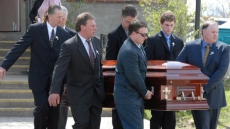PM Justin Trudeau made a formal apology in the House of Commons for the Komagata Maru incident in 1914.
Komagata Maru apology: PM apologizes for Canada's 1914 rejection of South Asia immigrants. https://t.co/hMCnHhpgSt https://t.co/OWDL7ul85z
— CBC News (@CBCNews) May 18, 2016
Opposition Leader Rona Ambrose, NDP Leader Tom Mulcair, BQ Leader Rheal Fortin and Green Party Leader Elizabeth May also rose to add their voices to the apology and to offer their own remarks.
"No words can fully erase the suffering of Komagata Maru victims. Today, we apologize and recommit to doing better," Trudeau said. Trudeau recounted the details of the incident and Canada's role in denying entry to the passengers, saying "for that, we are sorry."

Trudeau also apologized for the delay in the formal apology and directly to the passengers' descendants, some of whom, he noted, were gathered in the House of Commons visitors' gallery to hear the apology.
As Trudeau finished his remarks, several members of the visitors' gallery overlooking the House of Commons rose and called out a traditional Sikh chant and response.
A TEXT OF THE PRIME MINISTER'S APOLOGY FOR THE KOMAGATA MARU INCIDENT
Mr. Speaker, I would like to begin by acknowledging the hard work done by many of my colleagues.
From my own caucus, I'd like to thank the members from Surrey-Newton and Winnipeg North for their tireless advocacy. They have petitioned the Canadian government for years to make the apology that will be made today. I thank them for their commitment to this cause.
From the Opposition benches, special mention must be made of the members from Calgary Heritage, Calgary Midnapore and the former member for Surrey North. Each deserves recognition for the work they have done to seek resolution for victims and their families.
As do the many organizations that have sought the same, in particular, the Professor Mohan Singh Memorial Foundation.
Mr. Speaker, today I rise in this House to offer an apology on behalf of the government of Canada, for our role in the Komagata Maru incident.
More than a century ago, a great injustice took place.
On May 23, 1914, a steamship sailed into Burrard Inlet in Vancouver. On board were 376 passengers of Sikh, Muslim and Hindu origin.
Those passengers, like millions of immigrants to Canada since, came seeking better lives for their families. Greater opportunities. A chance to contribute to their new home.
Those passengers chose Canada. And when they arrived here, they were rejected. ...
Mr. Speaker, Canada cannot solely be blamed for every tragic mistake that occurred with the Komagata Maru and its passengers.
But Canada's government was, without question, responsible for the laws that prevented these passengers from immigrating peacefully and securely.
For that, and for every regrettable consequence that followed, we are sorry. ...
I apologize, first and foremost, to the victims of the incident.
No words can fully erase the pain and suffering they experienced. Regrettably, the passage of time means that none are alive to hear our apology today.
Still, we offer it, fully and sincerely.
For our indifference to your plight.
For our failure to recognize all that you had to offer.
For the laws that discriminated against you, so senselessly.
And for not formally apologizing sooner.
For all these things, we are truly sorry.
I also wish to apologize to the descendants of the passengers of the Komagata Maru, including those who are here with us here today.
We can never know what your lives would have been like had your relatives been welcomed to Canada.
The ways in which your lives would have been different.
The ways in which Canada would have been enriched.
Those possibilities are lost to history.
For that — and to you — we apologize.
Just as we apologize for past wrongs, so too must we commit ourselves to positive action - to learning from the mistakes of the past, and to making sure that we never repeat them.
That is the unique promise and potential of Canada. ...
Mr. Speaker, before I finish, I would like to acknowledge one more member who has helped to bring the Komagata Maru incident to our national attention - the minister of national defence.
Before entering political life, the Minister was the commanding officer of the British Columbia Regiment Duke of Connaught's Own — the same regiment that once forced out the Komagata Maru.
A century ago, the minister's family might well have been turned away from Canada. Today, the minister sits beside us, here, in this House.
In a House that includes immigrants. That includes the daughters and sons — the granddaughters and grandsons — of immigrants.
The very makeup of this House should remind all of us that when we have the choice between opening our arms to those in need or closing our hearts to them, we must always choose the more compassionate path.
When we see injustice, we must speak up, and attempt to make things right.
When we make mistakes, we must apologize, and recommit ourselves to doing better.
Mr. Speaker, Canada is a country unlike any other. We are blessed to call it home.
Let us always endeavour to do better, and to be better.
Let us do that in honour of the victims of the Komagata Maru incident, and every courageous person who leaves behind family and familiar things, to bring to Canada the very best of who they are.
Thank you.
REMEMBERING KOMAGATA MARU
The chartered Japanese ship Komagata Maru sailed into the Vancouver harbour on May 23, 1914, with around 376 people, mostly Sikhs from Punjab. But the Canadian government allowed only 24 to land.
The chartered Japanese ship Komagata Maru sailed into the Vancouver harbour on May 23, 1914, with around 376 people, mostly Sikhs from Punjab. But the Canadian government allowed only 24 to land.
No words can fully erase the suffering of Komagata Maru victims. Today, we apologize and recommit to doing better. pic.twitter.com/NsryzhUbp1
— Justin Trudeau (@JustinTrudeau) May 18, 2016
The rest, after two months in Vancouver’s harbour, were forced to return to India. On July 23, 1914, the Komagata Maru left to return to India, upon returning some were killed and some were imprisoned by the then British Indian government authorities.

Here is a timeline of some events leading up to the apology:
May 1914: The Japanese steam ship Komagata Maru anchors just outside Vancouver, B.C., with 376 passengers on board — all Indians who were at the time also British subjects. The passengers were seeking to challenge existing immigration laws which refused entry to any Indians who had not arrived in Canada via a continuous journey from the home country — a nearly impossible feat at the time.
June 1914: Twenty passengers who had previously resided in Canada are allowed in, but the rest are required to stay on the ship.
July 1914: After court hearings and clashes with authorities, the ship is finally escorted out of Canadian waters and sets sail for Calcutta, India.
September 1914: Police in India attempt to force the passengers onto trains for Punjab; a riot ensues and 19 people are killed. Others are arrested or go into hiding.

2002: Alliance MP Gurmant Grewal presents a petition in the House of Commons calling on the Liberal government of the day to issue an apology.
2006: Conservative Prime Minister Stephen Harper says he'll consult with Indo-Canadians to determine how to recognize the "sad moment" in Canadian history.
2007: NDP put forward a motion calling on the government to apologize but it's voted down by the Conservatives.

May 2008: Liberal MP Ruby Dhalla, one of the first Sikh women elected to the House of Commons, introduces a similar motion and it passes later that month.
May 2008: The B.C. legislature passes its own resolution apologizing.
August 2008: Prime Minister Stephen Harper gives a speech at a major South Asian festival in B.C. and issues an apology. It's almost immediately rejected by several prominent organizations as it was not presented in the House of Commons.
May 2012: The NDP puts forward a new motion calling for an apology in the House of Commons. The motion is voted down by the Conservatives.

August 2015: Liberal Leader Justin Trudeau repeats 2008 pledge that, if elected, his government would issue a formal apology in the House of Commons.
April 2016: Trudeau announces he will issue the apology in the House of Commons on May 18, 2016.
See archival photos of the Komagata Maru and its passengers.https://t.co/eLY8CXQBse
— CanadianPM (@CanadianPM) May 18, 2016
Former Prime Minister Stephen Harper apologized for the incident in 2008 at an event in British Columbia, but members of Canada’s Sikh community have long said an apology should be offered formally in Parliament.




